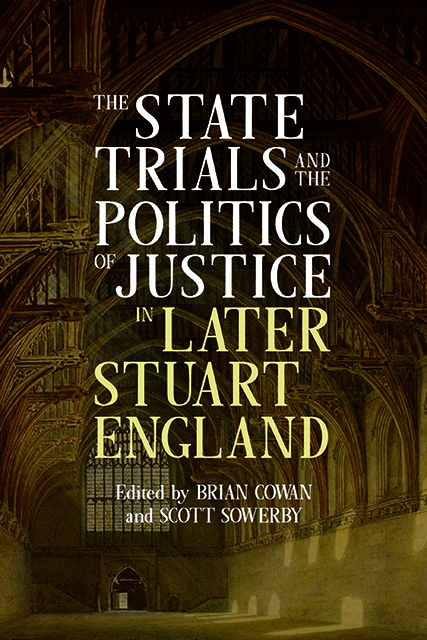Introduction: The State Trials in Historical Perspective
Published online by Cambridge University Press: 14 January 2023
Summary
The term ‘state trial’ was most likely invented by Thomas Salmon in the title for his compilation, A Compleat Collection of State-Tryals, and Proceedings upon Impeachments for High Treason, and other Crimes and Misdemeanours; from the Reign of King Henry the Fourth, to the End of the Reign of Queen Anne, published in four volumes in 1719. He used the term only in the title and not at all in the rest of the work, which perhaps indicates that he saw it as more of a marketing device than a formal legal category worth explicating. It might be said, in fact, that the term has no precise legal meaning at all. While Salmon did not offer a definition of the term ‘state trial’, one potential definition would be a legal proceeding in which matters of constitutional importance were at stake. It is hard to operationalize this definition, however, given that constitutional matters were often at stake in early modern trials, either explicitly or implicitly. If all legal proceedings regarding matters of constitutional importance were deemed to be ‘State-Tryals’, a mere four volumes could hardly represent a ‘Compleat Collection’ of them, as Salmon himself implicitly admitted by continuing to edit and reissue new collections, abridgements, and critical reviews of the state trials for several decades after the publication of the first Compleat Collection of State-Tryals. Another potential definition, under which a ‘state trial’ was any prosecution at law of an offense committed against the state, suffers from an even greater degree of capaciousness. It is perhaps best to adopt a nominal rather than a substantive definition, in which a state trial was any legal proceeding that Salmon and his collaborators deemed to be sufficiently weighty or notorious to include in their publishing ventures. The concept of a ‘state trial’ was ultimately a marketing device, and an enormously successful one at that. It signalled to readers that an anthology of such trials would be politically relevant and oriented to the talk of the town, not dry as dust in the manner of legal dictionaries and formularies. Salmon’s compilation was followed by Sollom Emlyn’s in 1730, Francis Hargrave’s in 1776–81, and eventually the great compilation by William Cobbett, Thomas Bayly Howell, and Thomas Jones Howell in 1809–26.
- Type
- Chapter
- Information
- Publisher: Boydell & BrewerPrint publication year: 2021

